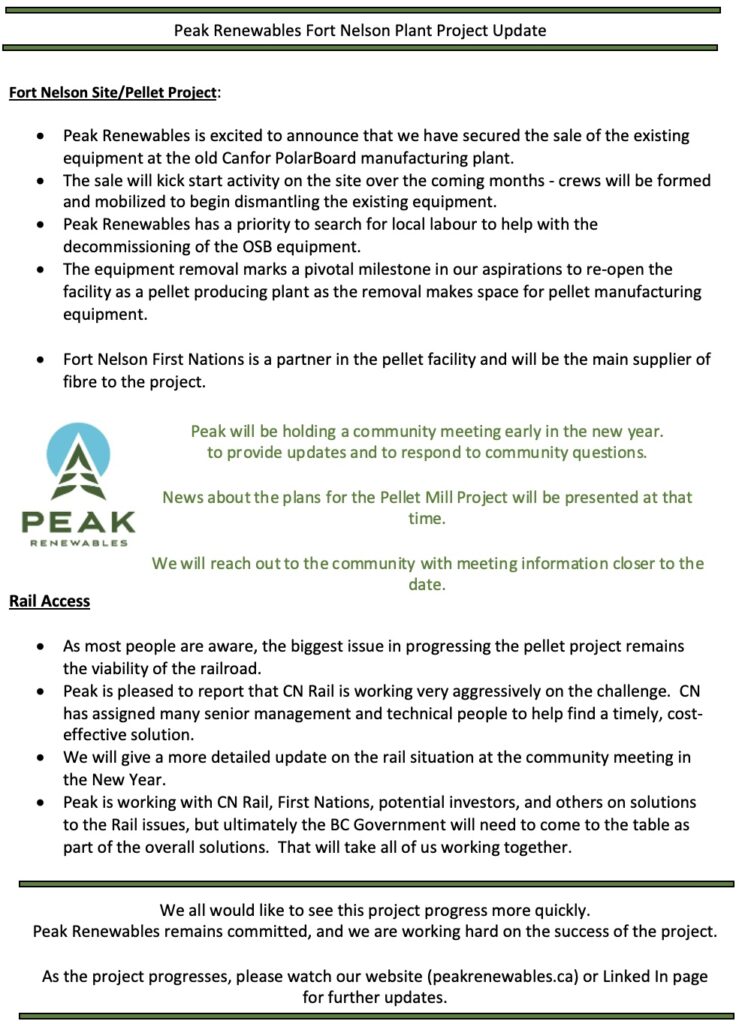
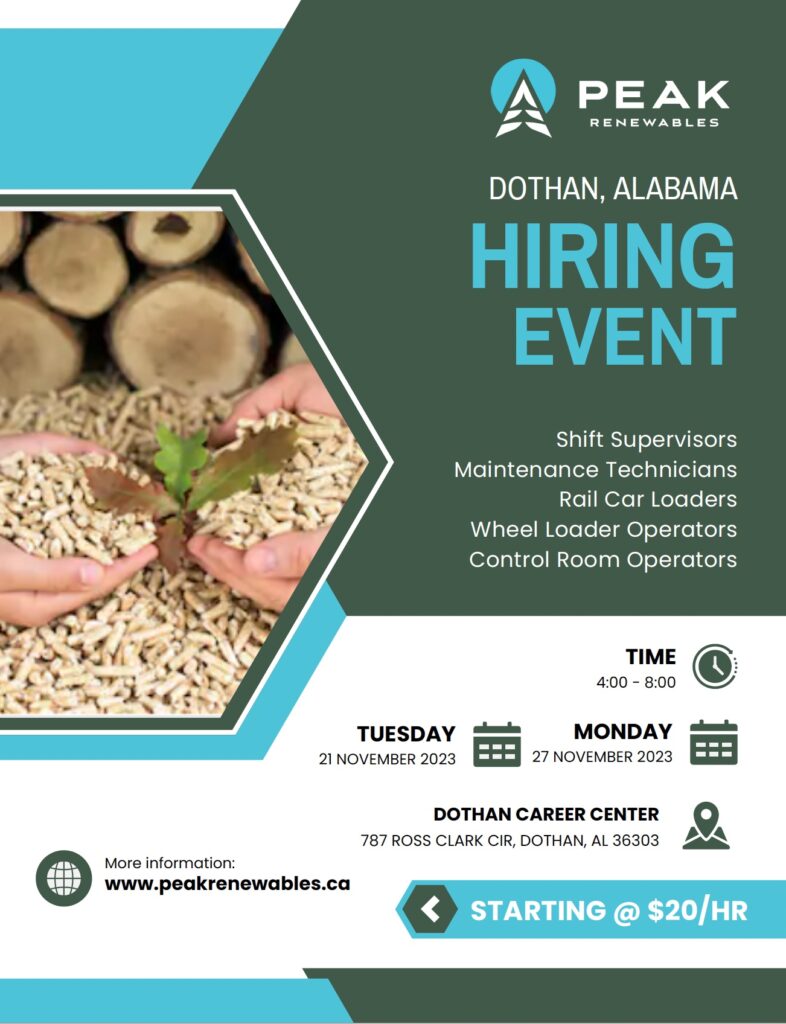
Peak Renewables is hiring! Join us at the Career Fair in Dothan and/or check our Careers page for more details.
See you in Dothan!

Peak Renewables Announces Acquisition of Chetwynd Pulp Mill from Paper Excellence
VANCOUVER BC, March 17, 2022 – Peak Renewables Ltd. today announced that they have acquired the Chetwynd Pulp Mill previously owned and operated by Paper Excellence. The Chetwynd Pulp Mill has not operated since 2015. Peak Renewables will remediate the mill site and repurpose the land and buildings to other industrial uses.
“We are extremely pleased to acquire the Chetwynd Pulp Mill site,” said Scott Bax, CEO of Peak Renewables. “This is a large industrial site, with excellent services, located in a very strategic area. We believe there are multiple potential future uses for the site. We will pursue those opportunities in full partnership with local First Nations.”
“We welcome Peak Renewables and their plans to repurpose the site,” said Chief Justin Napoleon of Sealteau First Nations. “We are working with Peak on the site clean up, and we very much look forward to helping Peak develop new opportunities for sustainable economic development at the site.”
Canfor closes on Fort Nelson tenure transfer to Peak Renewables
November 17, 2021, Source: Canadian Forest Industries
Canfor has officially handed over its forest tenure in the Fort Nelson Timber Supply area in Northern B.C. to Peak Renewables. Canfor announced yesterday the closing of the deal, which involves a Replaceable Forest License with an annual allowable cut of 553,716 cubic metres.
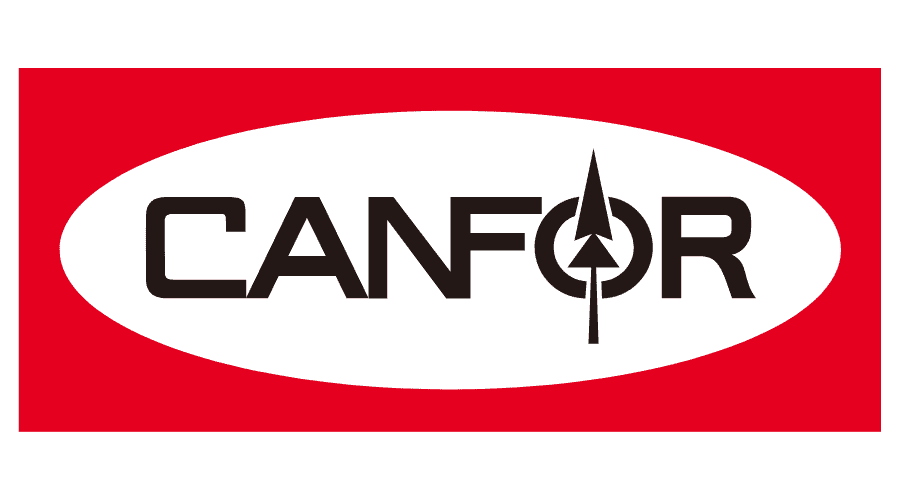
One Sky Forest Products Ltd. Develops OSB Mill for Prince Albert, SK.
September 08, 2021, 20:13 GMT Source: Peak Renewables
PRINCE ALBERT, SASKATCHEWAN, CANADA, September 8, 2021 /EINPresswire.com/ — One Sky Forest Products Ltd. (One Sky), together with its Indigenous partners, is moving forward with the development of a best-in-class, low-cost commodity Oriented Strand Board (OSB) facility in Prince Albert, Sk. “We are extremely pleased with today’s announcement from Minister Bronwyn Eyre awarding One Sky Forests Products and our partners the fibre tenures necessary to move our project forward,” said Brian Fehr, One Sky founder and Chair of the Board. “We have been working with our Saskatchewan investors and First Nations partners for over a year to get to this point and are eager to move to the next phase of project development. We thank the Government of Saskatchewan and look forward to developing this important project for Prince Albert, our First Nations partners and the people of Saskatchewan”.

Fort Nelson First Nation voices support for transfer of Canfor forest tenure to Peak Renewables.
Prince George Daily News – Published February 23, 2021
The Fort Nelson First Nation is voicing its support for Peak Renewables’ planned purchase of Canfor’s forest tenure in the region. The proposed $30 million tenure transfer comes after Peak Renewables purchased Canfor’s Fort Nelson mill assets late last year. The facilities included two timber processing plants — the PolarBoard-oriented strand board unit, idled in 2008, and the Tackama plywood plant, which was shut down in 2008. Peak Renewable’s plan is to build a pellet plant. Read the full story.
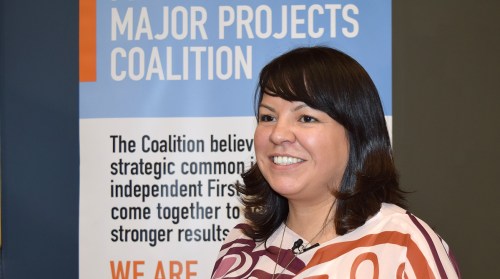
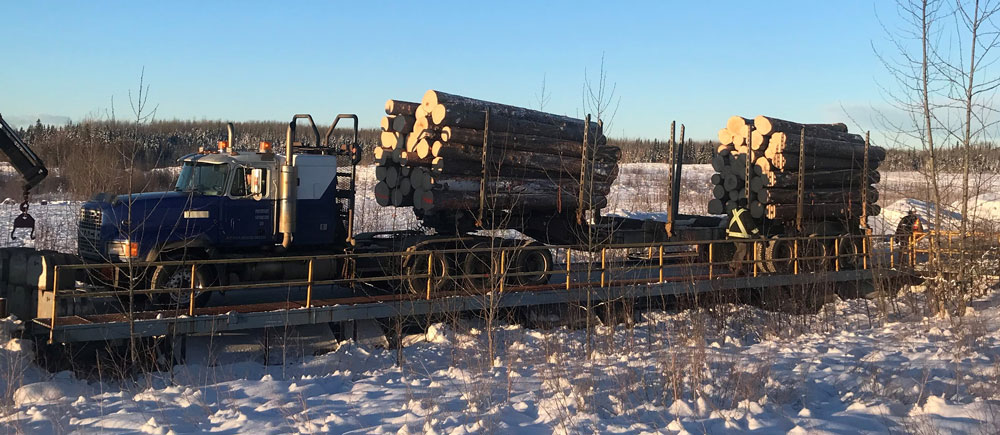
Logs are rolling in Fort Nelson. First truck of logs in 12 years heads to Fort St. John for processing into high value lumber.
Jan 14, 2021
We are starting to log in the FN region! This is the first truck of logs to roll across the weigh scale in 12 years. We are bringing back jobs where there weren’t any. How exciting!
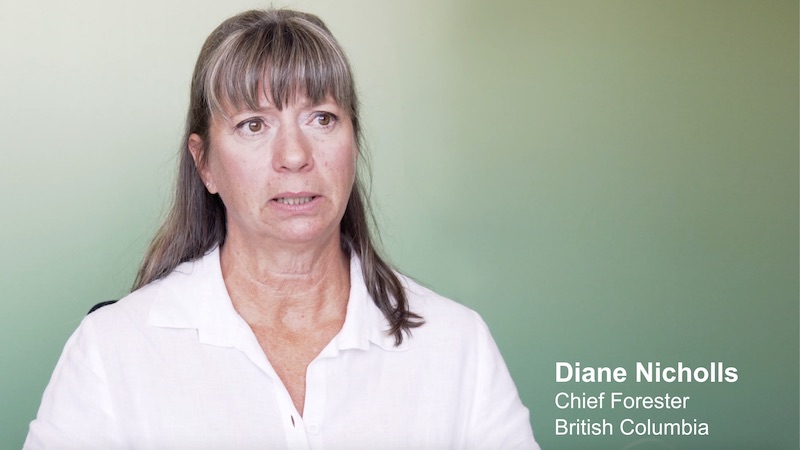
Diane Nicholls: Pellets a good news story for BC’s forests
Canadian Biomass
December 9, 2020
British Columbia’s Chief Forester Diane Nicholls believes that the province has one of the best sustainable forest management regimes in the world and that pellets are a critical piece of forest health and the future of the bioeconomy.
Earlier this summer, we sat down with Diane to talk about her role and where she sees wood pellets in BC’s future. As BC’s independent Chief Forester, Diane determines timber harvest levels on public lands across the province. Her other areas of responsibilities include BC’s forest carbon initiative, forest health and silviculture.
Pellet plant set to revive Fort Nelson forest sector
Fort Nelson First Nation will have equity stake in new Peak Renewables facility
By Nelson Bennett | December 1, 2020
An experienced team of forest industry entrepreneurs with a solid track record are partnering with the Fort Nelson First Nation to revive that region’s forest industry.
Last week, Canfor Corp. (TSX:CFP) announced the planned sale of its Fort Nelson Crown tenure to Peak Renewables, a startup backed by Brian Fehr, Order of BC recipient and founder and former owner of the BID Group, for $30 million.
Peak Renewables had already earlier purchased the old Canfor sawmill and oriented strand board (OSB) assets in Fort Nelson. That mill and plant have been shut down for more than a decade, and as a result, Fort Nelson is one of the few regions in B.C. with a surplus of harvestable timber. It recently got a bump in its annual allowable cut (AAC) because it has been under-harvested.

City of Cranbrook announces sale of former Tembec industrial lands for $6M
Kimberley Bulletin – Trevor Crawley Nov 19, 2020
The sale of nearly 100 acres of city-owned industrial land formerly owned by Tembec is now official.
Peak Renewables has purchased the property for $6 million, a company owned by Brian Fehr, an entrepreneur who has spent a lifetime in the forestry industry developing innovative technology and efficiencies for mill operations.
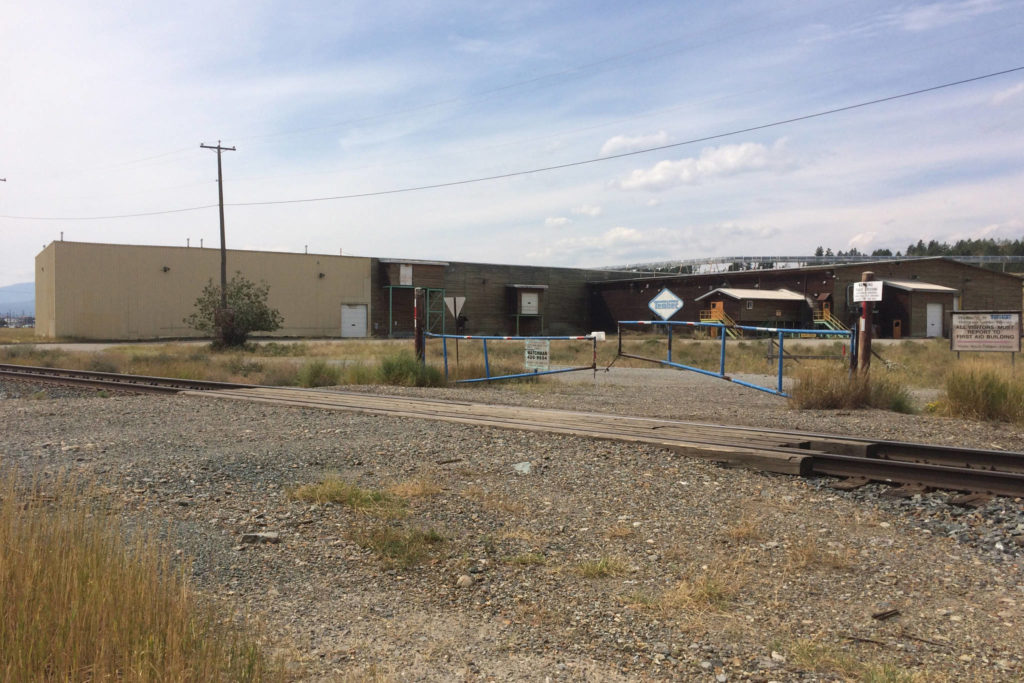

Argus Media
Canada’s Peak Renewables plans new BC pellet plant
London, 20 November (Argus) — Canadian biomass developer Peak Renewables is planning to build a 600,000 t/yr wood pellet production plant in Fort Nelson, northern British Columbia (BC), targeting start-up in the first quarter of 2022.
Peak Renewables reached an agreement earlier this month to purchase Canadian lumber firm Canfor’s assets and associated forest tenure in Fort Nelson. The facilities include two timber processing plants — the PolarBoard-oriented strand board unit, idled in 2008, and the Tackama plywood plant, which was shut down in 2008. The purchase is expected to close in the first quarter of 2021, Canfor said.
When operational, the plant’s output will be transported by the Canadian National rail link to the BC port of Vancouver for export.
Peak Renewables plans to use a broad range of wood fibre and forest residues for production. It noted that the forest bordering Fort Nelson has not been commercially harvested since 2008.
A downturn in the lumber market drove sawmill curtailments and shutdowns over the past few years, and the Covid-19 pandemic forced more closures earlier this year. These have been particularly acute in BC, prompting Canadian pellet producers to diversify their raw material supply beyond typical sawmill residues.
Peak Renewables is in the process of speaking to several potential customers, the firm told Argus.
Old Canfor land to become new site for water treatment
STEPHANIE HAGENAARS Oct. 23, 2020 6:00 a.m. | Clearwater Times
The community of Vavenby’s future water treatment system has a home, thanks to a land donation from the new owners of what was the Canfor sawmill.
Brian Baarda, chief executive officer of Peak Renewables, and British Columbian entrepreneur, Brian Fehr, visited the old Canfor site Monday morning to announce the donation of a chunk of the property to the Thompson-Nicola Regional District to be used for a future water treatment system for Vavenby’s roughly 700 residents.
“Do the right thing for the people of Vavenby,” said Fehr.
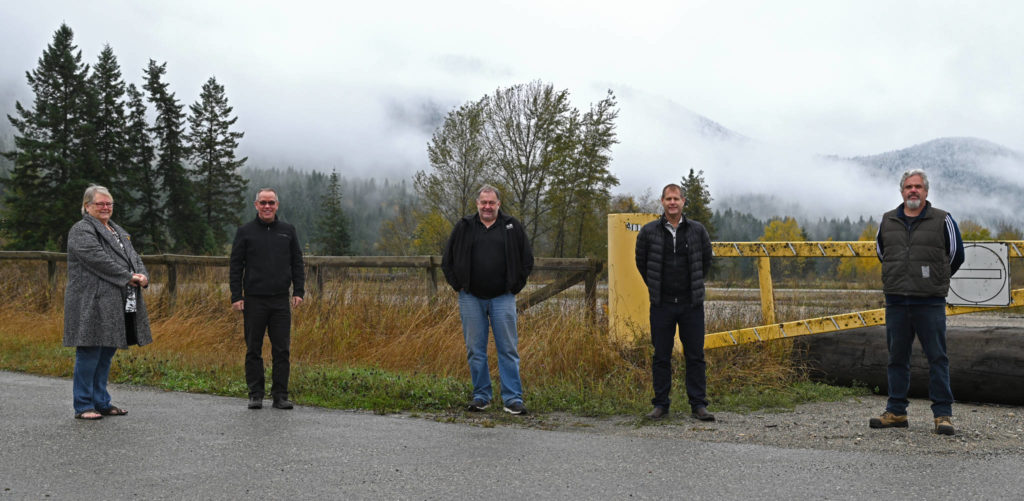
Canadian Biomass
News Harvesting Pellets Sustainability
Canfor to sell Fort Nelson forest tenure to Peak Renewables
Canfor will sell its forest tenure in the Fort Nelson region of British Columbia to the wood pellet company that purchased Canfor’s Fort Nelson mill assets in the third quarter of 2020. Read full article.


Canfor Signs Agreement with Peak Renewables to Sell Fort Nelson Tenure
For Immediate Release November 17, 2020
Vancouver, BC, Canada – Canfor announced today it has reached multi-year $30-million agreements
with Peak Renewables involving the sale of the Company’s forest tenure in the Fort Nelson region of
British Columbia. The transactions are subject to customary closing conditions, including approval from
the BC Minister of Forests. Closing is expected to occur in the first quarter of 2021.
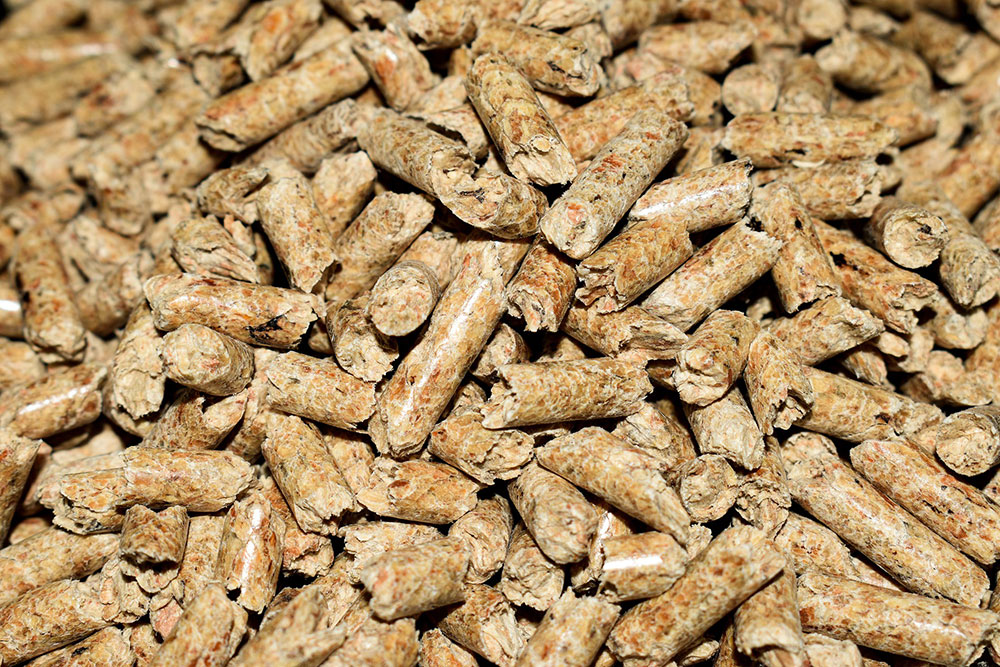
Canadian Biomass Magazine – September 2020 issue
CANADA’S WOOD PELLETS: THE ROLE OF WOOD PELLETS IN MEETING CLIMATE CHANGE GOALS – Responsible, Renewable Clean Energy
For decades, wood waste from manufacturing was burned in beehive burners and unwanted logs, branches and tops from harvesting were left on site, creating a fire and insect risk. Today, an increasing amount of that waste is being turned into wood pellets in Canada. Those pellets are used around the world to produce clean energy and to displace fossil fuels – supporting efforts to meet important global climate change targets.

Sustainable Biomass Program Consultation on the Final Draft Regional Risk Assessment for the Province of British Columbia, Canada
Posted on September 3, 2020 at 4:05 pm.
SBP has today opened a public consultation on the Final Draft Regional Risk Assessment (RRA) for the Province of British Columbia, Canada. Interested parties are invited to provide written comments on the draft. The Final Draft RRA for the Province of British Columbia, Canada has been prepared at the request of the Wood Pellet Association of Canada (WPAC), which provided financial support for developing the RRA in accordance with SBP RRA Procedure v1.0. The risk assessment work was facilitated by Hopkin Forest Management Consulting Ltd. The Final Draft RRA may be viewed at: https://sbp-cert.org/documents/consultation-documents/live-consultations/risk-britishcolumbia/. Interested parties are invited to provide written comments to info@sbp-cert.org by the close of business on Monday, 5 October 2020.
Regional Risk Assessments are a key part of SBP’s focus on identifying and mitigating risks associated with sourcing feedstock for biomass wood pellet and woodchip production. The SBP certification system is designed to provide assurance that all feedstock is sourced legally and sustainably. Feedstock certified at the forest level through FSC® or PEFC schemes and feedstock from recycled sources is automatically SBP-compliant. All other feedstock must be evaluated using a risk-based approach.
Typically, the Biomass Producer – a pellet or woodchip mill – is responsible for carrying out the risk assessment and putting in place mitigation measures to manage any specified risks such that they can be considered as controlled and hence low risk. It is the role of an independent, third-party accredited Certification Body to determine, amongst other things, that the feedstock evaluation has been correctly undertaken.
The purpose of a Regional Risk Assessment is to evaluate an entire geographic region and determine the risks associated with sourcing feedstock for biomass wood pellet or woodchip production from that region. Thus, the need for individual Biomass Producers to conduct risk assessments is avoided. Further, Regional Risk Assessments are particularly valuable where statutory protection for forested land is limited.
For more information, please contact:
Melanie Wedgbury (SBP)
T: +44 (0)7734 793279
E: mkwedgbury@sbp-cert.org
Canadian Biomass Magazine – July 2020 issue
ACHIEVING A BALANCE: Canada’s wood pellets come from sustainably managed forests
Canada has 348 million hectares of forests, making it the third-most forested country in the world after Russia and Brazil. Even after accounting for the establishment of cities and conversion to farmland, Canada still has 90 per cent of its original forest cover. At an annual harvest rate of 0.2 per cent, Canada will always have forests for the future. In fact, timber losses resulting from insects, disease, and fire exceeds the annual amount harvested. Here’s a great visual on what BC’s annual sustainable forest harvesting looks like as determined by the province’s Chief Forester
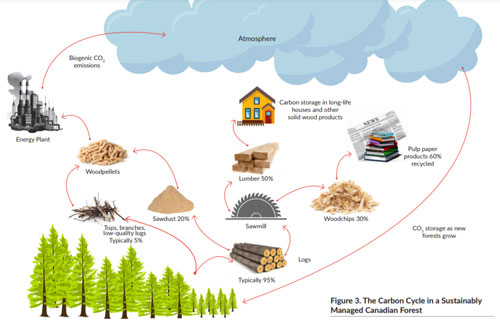
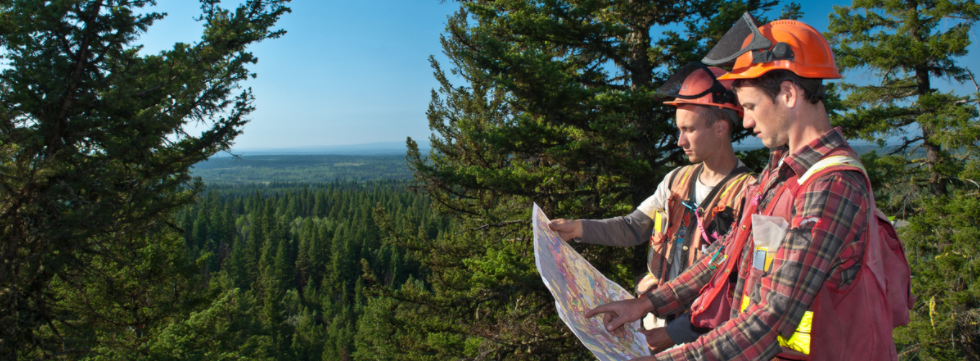
Canadian Biomass Magazine – July 2020 issue
Canada’s Wood Pellet Industry: Leading the Way in Certified Fibre
Canada is a leading supplier of wood pellets from certified sustainable and legal sources. Today, electric power stations in Europe and Asia are using Canadian wood pellets to displace coal and reduce fossil greenhouse gas (GHG) emissions. For example, Drax Power operates the world’s largest biomass power station providing about six percent of the UK’s electricity supply. Drax was a former coal power station that converted to wood pellets, thereby reducing its GHG emissions by more than eighty percent. Many of these wood pellets are imported from Canada.
Global customers are committed to sustainability throughout their supply chains and ensuring the legality and sustainability of their biomass supply is critical to their business models. Canada’s wood pellet industry plays a large part in helping customers meet their commitments with a growing supply of pellets produced entirely from the residuals of sustainably managed forests. Canada’s forests are highly regulated to comply with some of the most stringent regulations in the world, and those regulations are enforced by government and backed by independent certification.
